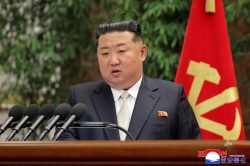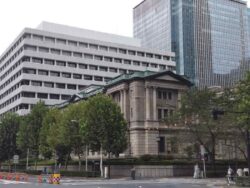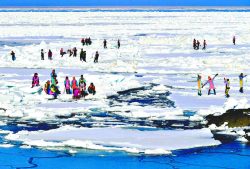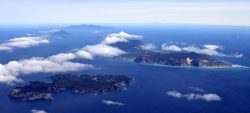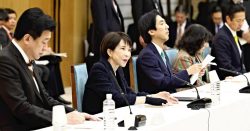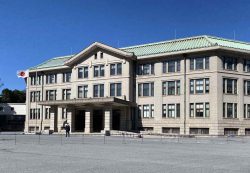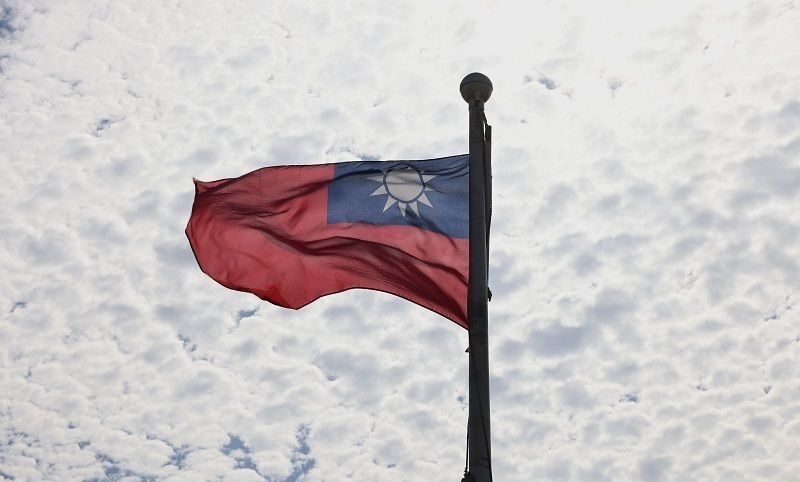
A Taiwan flag flaps in the wind in Taiwan in June 2021.
12:36 JST, December 2, 2023
TAIPEI (Reuters) — Beijing has sponsored cut-price trips to China for hundreds of Taiwa politicians ahead of key elections on the island, according to Taiwan sources and documents, unnerving officials with a broad campaign that one called “election interference.”
President Tsai Ing-wen and other Taiwan officials have warned that China might try to sway voters toward candidates seeking closer ties with Beijing in the elections, which could define the island’s relations with China. But the scale of the Chinese activity has not previously been reported.
Beijing, which claims democratically governed Taiwan as its own and has ramped up military and political pressure to force the island to accept its sovereignty, frames the Jan. 13 presidential and legislative elections as a choice between “peace and war,” calling the ruling party dangerous separatists and urging Taiwan people to make the “right choice.”
Taiwan law forbids election campaigns from receiving money from “external hostile forces,” including China, and prosecutors in southern Taiwan this week said they were investigating 22 people, including grassroots politicians, for potential violations of election and security laws.
Across Taiwan security agencies are looking into more than 400 visits to China in the past month, most led by local opinion leaders such as borough chiefs and village heads, a Taiwan security official looking into China’s activities told Reuters.
The agencies believe the trips, with discounted accommodations, transportation and meals, were subsidized by units under China’s Taiwan Affairs Office, said the person, who requested anonymity due to the sensitivity of the matter.
The Chinese office did not respond to a request for comment. It has previously said it respects Taiwan’s “social systems” when commenting on the elections.
Asked for comment, Taiwan’s Mainland Affairs Council, the top China-policy body, referred Reuters to comments this week by its minister, Chiu Tai-san. He said it was “self-evident” Beijing was trying to sway Taiwan elections through means including free trips for politicians.
“They have already made it clear that a so-called ‘right choice’ has to be made, meaning choosing candidates that the Chinese Communist Party prefers,” he told reporters without elaborating.
People taking these trips typically pay their own airfare, but other expenses are offered by Chinese authorities, officials looking into the matter said.
“Election interference has started under the name of group tours,” said a second Taiwan security official, who was briefed on the matter, adding Beijing was targeting politicians crucial to the island’s administrative systems who play key roles in shaping public opinion.
More than 300 borough chiefs or village heads from populous central Taiwan alone have participated in such trips to China in the past few months, this person said.
More than 20 borough chiefs from a district of the capital Taipei joined a China-sponsored trip to Shanghai with their families in September, while more than 10 people from an association for local politicians in neighboring New Taipei City joined a trip this week, according to two security reports reviewed by Reuters.
The number from the Taipei district has “increased significantly” compared with elections four years ago and registrations have been “fairly enthusiastic,” one report said. “Certain borough chiefs have become the window of contacts in Taiwan for some Chinese units.”
So far this year, more than 1,000 borough chiefs or village heads joined such trips, more than last time, the second official said, adding China was targeting electoral districts where support was strong for candidates campaigning for closer China ties.
In the investigation in the southern city of Kaohsiung, prosecutors said they believed the five trips from there were fully funded by China’s Taiwan Affairs Office.
Chinese officials allegedly asked participants to support certain political parties and “oppose Taiwan independence,” the prosecutors said in a statement.
“There is no such thing as a free lunch,” Prosecutor General Hsing Tai-chao said on Thursday. He said external forces were trying to influence citizens in an “unprecedented fashion” and urged Taiwan people not to accept perks or instructions from Chinese authorities when traveling there.
Building criminal cases against trip-takers is challenging, security officials said, because it can be hard to establish a money trail to Chinese state agencies behind the tours, which often come much below going market rate, and to establish what was said during meetings with Chinese officials.
Taiwan suspended group tours to China via travel agencies after the COVID-19 pandemic, but there are no restrictions on individuals visiting.
Recent government scrutiny has prompted some politicians to be more low-key about such trips, the two officials said, with some making arrangements separately, then gathering in China.
“They now even avoid sitting in seats next to one another during their flight.”
Top Articles in News Services
-

Survey Shows False Election Info Perceived as True
-

Hong Kong Ex-Publisher Jimmy Lai’s Sentence Raises International Outcry as China Defends It
-

Japan’s Nikkei Stock Average Touches 58,000 as Yen, Jgbs Rally on Election Fallout (UPDATE 1)
-

Japan’s Nikkei Stock Average Falls as US-Iran Tensions Unsettle Investors (UPDATE 1)
-

Japan’s Nikkei Stock Average Rises on Tech Rally and Takaichi’s Spending Hopes (UPDATE 1)
JN ACCESS RANKING
-

Producer Behind Pop Group XG Arrested for Cocaine Possession
-

Japan PM Takaichi’s Cabinet Resigns en Masse
-

Man Infected with Measles Reportedly Dined at Restaurant in Tokyo Station
-

Israeli Ambassador to Japan Speaks about Japan’s Role in the Reconstruction of Gaza
-

Videos Plagiarized, Reposted with False Subtitles Claiming ‘Ryukyu Belongs to China’; Anti-China False Information Also Posted in Japan



